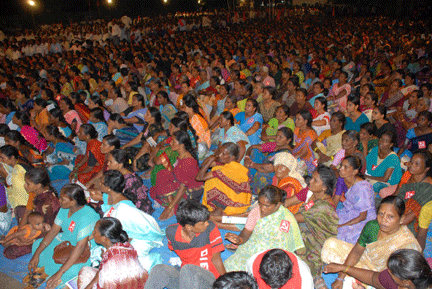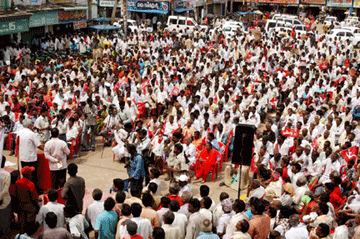 People's Democracy
People's Democracy
(Weekly
Organ of the Communist Party of India (Marxist)
No. 37
September 16, 2007
(Weekly
Organ of the Communist Party of India (Marxist)
|
Vol.
XXXI
No. 37 September 16, 2007 |
INTERVIEW WITH PRAKASH KARAT
“People Are Understanding The Message”

Women attending the meeting in large numbers at Guntur, late evening on September 6
[CPI(M) general secretary Prakash Karat spoke to People’s Democracy on the third day of the jatha, while travelling in Andhra Pradesh. The following are excerpts from the interview]
Q: The jatha is almost nearing Vishakapatnam. How would you describe your experience so far?
Prakash Karat: Since we started the jatha on September 4 evening in Chennai, we have got a big response from the people, all along the route of the jatha. In the meetings in Tamilnadu, and in the last two days in Andhra Pradesh, we have found, peasants, agricultural workers, employees, small shopkeepers and the middle classes attending our meetings. In Andhra Pradesh, particularly, there is great enthusiasm amongst the cadres and activists of the two communist parties.
Q: What have been the significant features of the jatha so far?
PK: A significant feature has been that people understand the message of the Left parties that allying with American imperialism is not in the interests of the country. People remember how the Seventh Fleet of the US navy came to the Bay of Bengal in 1971 during the Bangladesh liberation struggle. While the Indo-US nuclear deal has dominated in the media, the campaign has brought out that the wide-ranging alliance with the US has serious consequences for the peoples’ livelihood and economic well-being. How the partnership with America will lead to the Walmart coming into the retail trade ruining the livelihood of lakhs of shopkeepers and traders; the entry of American companies like Monsanto in our agricultural research; the American pressure for change in our labour laws; for opening up the insurance and banking sectors have all been highlighted during the jatha. In Andhra Pradesh the campaign has had an extra momentum because the two Left parties are engaged in the land struggle which has found wide participation in all the areas. The meetings during the jatha at whatever time they are held, including mid-day in the blazing sun, are well-attended and getting bigger response. Nellore town, Ongole, Guntur, Vijayawada, Machilipatnam, Bhimavaram – all have seen big meetings. I am told the jatha from Kolkata to Vizag is also getting a good response in Orissa.
Q: The Left cadres appear to be charged up and their morale seems high. Is it because of the anti-imperialist issue?
PK: Before we launched the jatha, for more than three months the CPI(M) and CPI have been in the thick in the struggle for house sites and distribution of land. In the districts that we have travelled so far – Nellore, Prakasam, Guntur and Krishna – the activists have braved police repression and fought for house sites and land. For instance, in Krishna district, as of now, 9,384 acres of land were occupied in 219 centres. Out of the 60,000 people who have participated in the struggle, 40,000 were women. In Prakasam district, 15,000 acres of land have been occupied in 110 centres. In Nellore district, 22,400 acres of land ere occupied in 106 centres. In Guntur district, in the first phase of the struggle, in 61 centres occupation of land took place and 670 people arrested of whom 124 were sent to jail.
Since the land struggle is going on, the anti-imperialist campaign has also found an excellent response. We have seen people who are involved in the land struggle joining the meetings and receptions for the jatha in a big way.
Q: In your speeches you are often referring to the ongoing land struggle in Andhra Pradesh. How is it linked with the present anti-imperialist movement?
PK: The government is pushing for corporatisation of agriculture, removal of the urban land ceiling act and has allowed FDI in real estate. These are all policies which the United States is pressing upon India and they found their place in their recommendations made by the US-India CEO forum in March 2006 which were so enthusiastically welcomed by the deputy chairman of the Planning Commission. These are the opposite of land reforms. All these would result in land being alienated from the peasants, and urban land going out of the reach of the ordinary people.

Prakash Karat addressing the gathering in Machilipatnam on September 7
Such policies pursued by the UPA government and the Congress government of Andhra Pradesh are at the root of the land problem. Thus the fight against imperialism is directly related to the land struggle. An important feature of the struggle in Andhra Pradesh is the demand for house sites for the poor in the urban areas. The US-India CEO Forum had actually called for the scrapping of the Urban Land Ceiling Act. Allowing FDI in real estate has fuelled speculation in real estate and led to skyrocketing land prices. That is why in the towns and cities of Andhra Pradesh, it has become impossible for the poor and even the middle classes to find land for housing.
The struggle for house sites for the urban poor is directly against such policies.
Q: You have stated in your press conference yesterday that the motives of BJP on the nuclear deal are suspect due to their prevention of a discussion in parliament. Please explain.
PK: By disrupting parliament and not allowing discussion on the nuclear deal, the BJP has actually helped the government. Otherwise, the debate in parliament would have shown that the majority of MPs are against the nuclear deal. Already the BJP has stated that it is not against the strategic alliance with the United States. In fact, it was the BJP-led government which went far ahead by declaring that India is a natural ally of the United States.
Q: What is the future course of action with regard to the Indo-US nuclear deal?
PK: The Committee set up of UPA and Left leaders will have to start its work and come to some findings. Till then we don’t expect the government to proceed with the negotiations at the IAEA for the safeguards agreement. After the Committee completes its work, we have to see what the government proposes to do. If they decide to go ahead with the IAEA, our central committee has authorised the Polit Bureau, to take appropriate measures to meet the situation.